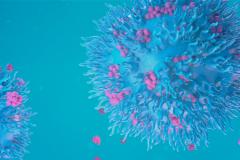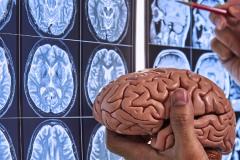- Overview
-
My research concentrates on the pathobiochemistry of genetic neurometabolic diseases. We are using an integrated approach based on clinical, biochemical, molecular genetic, magnetic resonance spectroscopy (MRS), and imaging analyses to study two disease groups as a model for this. First, creatine deficiency syndromes: three novel genetic disorders of creatine synthesis and transport in the brain. Clinical features include mental retardation, expressive speech delay, and epilepsy. We study the three diseases on all levels, from an epidemiological description of molecular defects to an evaluation of treatment. The second group are disorders of energy substrate depletion in the developing brain (fatty acid oxidation defects, persistent hyperinsulinemic hypoglycemia). We are interested in the potential of ketone bodies and anaplerotic substrates to prevent brain injury caused by this. Our paramount aim is to develop improved treatment strategies in both disease groups and extend them to other metabolic diseases of the brain.
- Publications
-
Iron Deficiency and Sleep/Wake Behaviors: A Scoping Review of Clinical Practice Guidelines—How to Overcome the Current Conundrum?
Nutrients
Scout McWilliams and Olivia Hill and Osman S. Ipsiroglu and Stefan Clemens and Alexander Weber and Michael Chen and James Connor and Barbara T. Felt and Mauro Manconi and Andre Mattman and Rosalia Silvestri and Narong Simakajornboon and Susan M Smith and Sylvia Stockler
DOI: 10.3390/nu16152559
08/2024Morquio-like dysostosis multiplex presenting with neuronopathic features is a distinct GLB1-related phenotype
JIMD Reports
Sylvia Stockler-Ipsiroglu and Nahid Yazdanpanah and Mojgan Yazdanpanah and Marioara Moisa Popurs and Nataliya Yuskiv and Mara Lúcia Schmitz Ferreira Santos and Chong Ae Kim and Carolina Fischinger Moura de Souza and Charles Marques Lourenço and Carlos Eduardo Steiner and Andressa Federhen and Luciana Giugliani and Débora Maria Bastos Pereira and Luz Elena Durán-Carabali and Roberto Giugliani
DOI: 10.1002/jmd2.12211
07/2021Developments in evidence creation for treatments of inborn errors of metabolism
Journal of Inherited Metabolic Disease
Sylvia Stockler-Ipsiroglu and Beth K. Potter and Nataliya Yuskiv and Kylie Tingley and Marc Patterson and Clara van Karnebeek
DOI: 10.1002/jimd.12315
01/2021Morquio B Disease. Disease Characteristics and Treatment Options of a Distinct GLB1-Related Dysostosis Multiplex
International Journal of Molecular Sciences
Nataliya Yuskiv and Katsumi Higaki and Sylvia Stockler-Ipsiroglu
DOI: 10.3390/ijms21239121
11/2020Morquio-B disease: Clinical and genetic characteristics of a distinct GLB1-related dysostosis multiplex
JIMD Reports
Iman S. Abumansour and Nataliya Yuskiv and Eduard Paschke and Sylvia Stockler-Ipsiroglu
DOI: 10.1002/jmd2.12065
01/2020 - Research
-
Metabolic neuroprotection by ketone bodies and anaplerotic substrates in a rat model of insulin-induced infantile hypoglycemia
Severe recurrent hypoglycemia in infancy is a recognised pediatric condition with potential neurological sequeleae. Determinants of the severity of brain injury are incompletely understood. The developing vs. adult brain has a higher potential for the utilisation of alternative energy substrates and it has been suggested that an intact ketogenic response to low circulating glucose levels is a protective factor. Most conditions causing severe recurrent hypoglycemia in infancy (persistent hyperinsulinemic hypoglycemia of infancy, fatty acid oxidation defects) also disrupt this ketogenic response. We hypothesise that the supplementation of ketone bodies in these conditions may improve the neurological outcome.
To investigate this neuroprotective effect and its limitations we will develop a model of hyperinsulinemic hypoglycemia in infant rats and study the effects of D-3-hydroxybutyrate administration. Based on recent analyses of the interconnections between pathways of energy metabolism and glutamate synthesis in the brain, we anticipate that ketone bodies may show biochemical limitations to sustaining glutamergic brain function and possibly neuronal survival. Current understanding suggests this could be patched by additional provision of anaplerotic substrates.
Clinically, the aim of this project is to establish an experimental basis for a trial of ketones and anaplerotic substrates in conditions of recurrent severe hypoglycemia of infancy or related conditions. Experimentally, the model will lend itself to studies of the pathobiochemical significance of alternative energy substrate metabolism and anaplerotic pathways in the developing brain.Tackling mental retardation: Development of screening and diagnostic methods for the recognition of X-linked creatine transporter (CRTR) deficiency, a newly described mental retardation syndrome
Mental retardation affects 2-3% of the general population. The majority of cases are genetic in origin but otherwise unexplained. About 70% of patients with unexplained mental retardation are males, suggesting a high contribution of X-linked disorders. Recent studies have shown that X-linked creatine transporter (CRTR) deficiency accounts for 2% of X-linked mental retardation. This equals the incidence of Fragile-X syndrome, which currently is considered the most frequent cause of X-linked mental retardation.
Recently it has also been shown that patients with X-linked CRTR deficiency have a low ratio of urinary creatine to creatinine excretion. The BC Children's Hospital (BCCH) Biochemical Genetics Laboratory has now established a liquid chromatography/tandem mass spectrometry method for the measurement of both. This opens the exciting possibility of establishing a reliable, high throughput screening method for X-linked CRTR deficiency. Diagnosis will be confirmed by molecular genetic and functional creatine uptake studies in skin fibroblasts.
Oral creatine substitution is effective in the treatment of some creatine deficiency syndromes (GAMT and AGAT deficiency), however, current protocols of oral creatine substitution for CRTR deficiency have not proven effective. So far, the limited number of known patients has made the search for better treatment difficult. This screening program will also help to overcome this obstacle.
The final goal is to develop BCCH and CFRI as the North American diagnostic and research center for cerebral creatine deficiency syndromes.Honours & AwardsScience Award, Best clinical work in 1996 (Lancet 348: 798-90, 1996), Austrian Pediatric Society - 1997
Research Group MembersPeter Axerio-Cilies, Research Staff
Hasti Keyvanloo, Research Student
Sally Lin
Tanvi Myneni, Research Student
Zahra Nasseri Moghaddam
Andrea Varela, Clinical Research Coordinator, Research Assistant/Tech2
Gurnaib Virk, Research Assistant
Rhonwyn Waterson, Research Student
Nathan Zhao, Research Assistant
Congratulations CIHR Spring 2024 Project Grant recipients
Congratulations to the BC Children’s Hospital Research Institute (BCCHR) and Women’s Health Research Institute (WHRI) investigators and their teams who were awarded $5 million in funding through the Canadian Institutes of Health Research (CIHR) Spring 2024 Project Grant competition.






